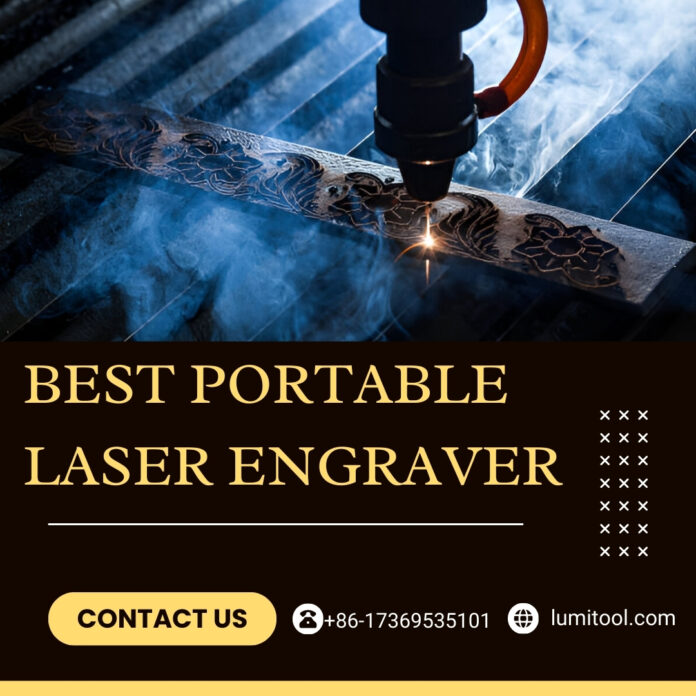When it comes to laser engraving and marking, fiber laser engravers stand out as one of the most efficient and precise technologies available. Whether you’re looking to engrave metals, plastics, or other materials, fiber laser engravers offer a range of advantages that make them ideal for various industries. In this guide, we’ll dive into what makes fiber laser engravers so effective and why they should be on your radar if you’re looking to take your business or project to the next level.
1. What is a Fiber Laser Engraver?
A fiber laser engraver is a type of laser marking or engraving machine that uses a fiber-optic laser to create precise marks on a variety of materials. The laser is generated by a fiber laser source, which is known for its efficiency, high beam quality, and ability to focus the laser to a small point, making it ideal for intricate designs.
Fiber lasers are typically used for metal engraving and marking, but they can also be effective on certain plastics and other materials. They operate at a wavelength of around 1064 nm, which allows for deeper penetration into materials, especially metals, providing high contrast and durability to the marks.
2. Advantages of Fiber Laser Engravers
a. Precision and Quality
One of the main reasons businesses opt for fiber laser engravers is their superior precision. These machines offer exceptional accuracy, ensuring clean, fine markings, even on the smallest of items. If you’re working with small or intricate designs, a fiber laser engraver provides the level of detail that other engraving methods simply can’t match.
Additionally, the beam quality of fiber lasers is incredibly high, which ensures that the engraving is sharp and clear. This is particularly important in industries like jewelry making, aerospace, and automotive parts, where precision is crucial.
b. Speed and Efficiency
Fiber lasers are known for their speed. The technology behind fiber lasers allows them to work faster compared to traditional engraving methods, saving time and improving productivity. If your business needs to meet high demand or handle large quantities of products, a fiber laser engraver can greatly increase efficiency without compromising on quality.
Furthermore, fiber lasers typically have a longer lifespan compared to CO2 lasers, which means lower maintenance costs over time. They also consume less energy, making them more cost-effective and environmentally friendly in the long run.
c. Versatility
Although fiber lasers are particularly suited for engraving metals, they are also effective on a range of materials, including plastics, ceramics, wood, and glass. This versatility makes them an excellent investment for businesses that work with various substrates. Whether you’re marking logos, serial numbers, barcodes, or other intricate designs, fiber laser engravers provide the flexibility you need to tackle different materials with ease.
d. Minimal Heat Affected Zone
Unlike traditional engraving methods, which can cause significant heat damage to the material being engraved, fiber lasers generate less heat, resulting in a minimal heat-affected zone (HAZ). This means less distortion and damage to the workpiece, allowing for finer, cleaner markings. It’s particularly beneficial when working with sensitive materials like plastic, where excessive heat can cause warping or discoloration.
3. Applications of Fiber Laser Engravers
Fiber laser engravers are used in a wide range of industries due to their versatility and precision. Here are some common applications:
a. Metal Engraving and Marking
Fiber lasers are the go-to choice for engraving and marking metals such as stainless steel, aluminum, copper, and titanium. They’re commonly used for engraving serial numbers, logos, barcodes, and product identification marks in industries like automotive, aerospace, and manufacturing.
b. Jewelry and Watchmaking
The precision and fine details provided by fiber laser engravers make them ideal for the jewelry industry. Whether it’s engraving custom designs or adding personalization to rings, bracelets, and watches, fiber lasers provide the clarity and durability required for high-end products.
c. Electronics and Electrical Components
In the electronics industry, fiber laser engravers are often used to mark circuit boards, connectors, and other small components. Their ability to create precise, high-contrast markings helps with product identification, traceability, and branding.
d. Plastics and Coated Materials
Fiber laser engravers are also effective at engraving plastics and coated materials, though the settings and parameters will need to be adjusted accordingly. This makes them suitable for applications such as marking phone cases, industrial parts, and consumer goods.
4. Choosing the Right Fiber Laser Engraver
When selecting a fiber laser engraver for your business, several factors should be considered:
a. Power
Fiber laser engravers come in various power options, typically ranging from 20W to 100W or more. The power you choose will depend on the materials you plan to engrave and the depth of marking required. For example, 20W lasers are suitable for engraving most metals, while higher-powered lasers may be necessary for thicker or more durable materials.
b. Work Area Size
The size of the work area will determine the size of the materials you can work with. Smaller work areas are typically more affordable and suitable for engraving smaller items like jewelry or electronics. Larger work areas are necessary for bigger products or batch processing, allowing for efficient multi-part engraving.
c. Software and Compatibility
Look for a fiber laser engraver that is compatible with design software you are familiar with. Many fiber laser engravers come with their own proprietary software, while others work with popular programs like AutoCAD, Adobe Illustrator, or CorelDRAW.
d. Brand and Support
Choose a reputable brand that offers excellent customer support and warranty options. Look for manufacturers that provide training, troubleshooting resources, and quick access to replacement parts in case of issues.
5. Conclusion
Fiber laser engravers are an excellent choice for businesses that require precision, speed, and versatility in their engraving processes. Whether you’re working with metal, plastic, or other materials, fiber laser engravers can help you achieve clean, detailed results quickly and efficiently. By considering factors like power, work area size, and software compatibility, you can find the perfect fiber laser engraver to meet your needs.
If you’re looking for more information or a top-quality fiber laser engraver, check out the Lumitool Optical Fiber Laser Marking Machine to explore cutting-edge technology that will elevate your business.































